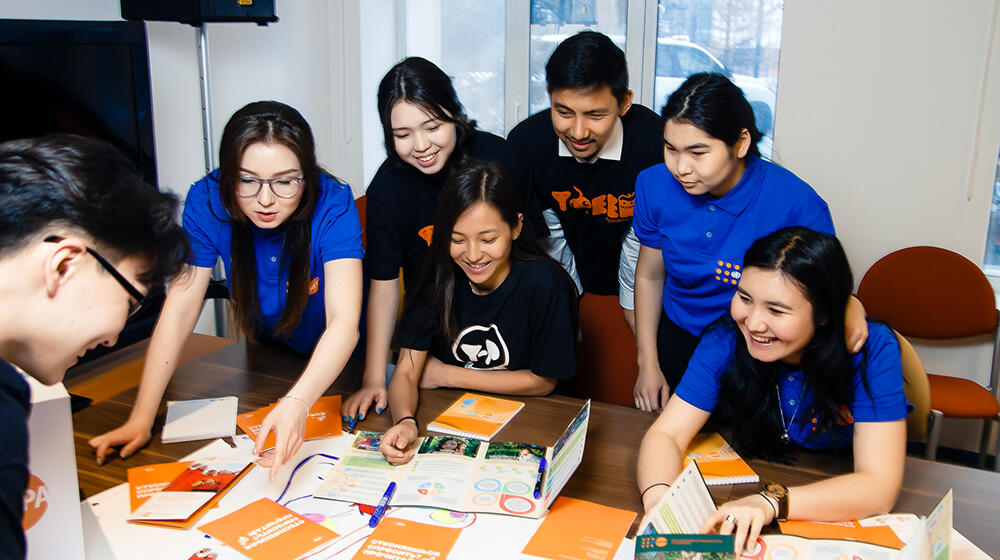Kazakhstan is committed to improving sexual and reproductive health for all.
The Central Asian country is developing laws to secure care for adolescents and young adults, including lowering the age of consent from 18 to 16.
"It was my first time with my boyfriend. We didn’t use a condom,” 17-year-old Amina* told UNFPA at one of the youth-friendly health centres in Almaty, Kazakhstan’s biggest city.
Comprehensive sexuality education had not been provided in her school curriculum, and she was not comfortable raising such issues with her family. So when her menstrual period did not come as scheduled, Amina panicked. “In two weeks, I realized I was late. I was freaking out. I was 16 at the time, and there was no way I could talk to my parents or teachers."
One decade ago, youth-friendly health services – meaning health services offering medically accurate sexual and reproductive health information, as well as nonjudgmental care suited to the evolving capacities of adolescents entering into early adulthood – were extremely limited in the country. While there had been private ‘health lifestyle promotion centres’, these were largely deemed unprofitable. Fewer than 120 youth-friendly health services were available, primarily in large cities, serving less than 1 per cent of the total population of young people aged 14 to 28, with inconsistent quality of care.
As a result, adolescents have been at heightened risk of early pregnancy and sexually transmitted infections. The use of contraceptives remains low among sexually active youth, and HIV cases are growing in this age group. A UNFPA survey of adolescents in 2018 found that 90 per cent of Kazakhstan teenage respondents could not identify all the ways HIV can be transmitted.
But all this is set to change.
Tracing the path of progress
In 2019, at the Nairobi Summit marking the 25th anniversary of the International Conference on Population and Development (ICPD), the Government of Kazakhstan committed to increasing adolescents’ access to outpatient health services and scaling up funding for youth-friendly sexual and reproductive health services.
Since making those commitments, UNFPA has worked with policymakers and the health ministry to develop a comprehensive legal framework to secure care for adolescents and young adults. This included lowering the age from which young people can receive many outpatient services without consent from their parents from 18 to 16 - a key measure to make it easier for youth to access the services they need in a confidential manner. UNFPA also helped to create clinical and operational standards meeting the World Health Organization’s recommended quality standards.
Existing youth-friendly health centres were strengthened, and awareness of their services was raised within communities. Legislation then mandated such facilities in every city of the country, and required that these services be covered in the mandatory social health insurance.
Thousands reached in just months
Funding is now flowing into the health centres, which are offering a wide range of services. "It is only this year that we finally received state funding, in January 2023,” said Dr. Sholpan Karzhaubayeva, who heads one of the centres in Almaty, earlier this year. Since then, “in four months, we recorded 3,286 individual visits to gynaecologists in our centre. In our centre, we also provide psychological consultations for our young patients."
Seventeen-year-old Amina was among those to receive care. She explained that missing her period after her first sexual encounter had left her frightened and unsure where to turn. But at the centre, she has been able to receive stigma-free information and advice from doctors.
This kind of care will soon become the norm. The Almaty centre is considered a “resource facility”, offering a model for the rest of the country’s 170 youth-friendly health centres, Dr. Karzhaubayeva explained. “We often host open day lectures, conduct outreach events at the universities and colleges, and build the capacity of youth-friendly health centre specialists throughout the country."
UNFPA has supported training for around 300 physicians, psychologists and social workers, and the state has provided funding of $35 million between 2021 and 2025, a promising start for youth-friendly health services nationwide.
Already, “the centres are making a tremendous difference,” said Serik Tanirbergenov, a UNFPA programme analyst on sexual and reproductive health.
On top of sexual and reproductive health care being funded, and in addition to service quality being raised and standardized, all young people will be entitled to care, Mr. Tanirbergenov emphasized.
“All teenagers in Kazakhstan, regardless whether they live in a big city or a small town, will receive the same care.”
*Name changed for privacy


